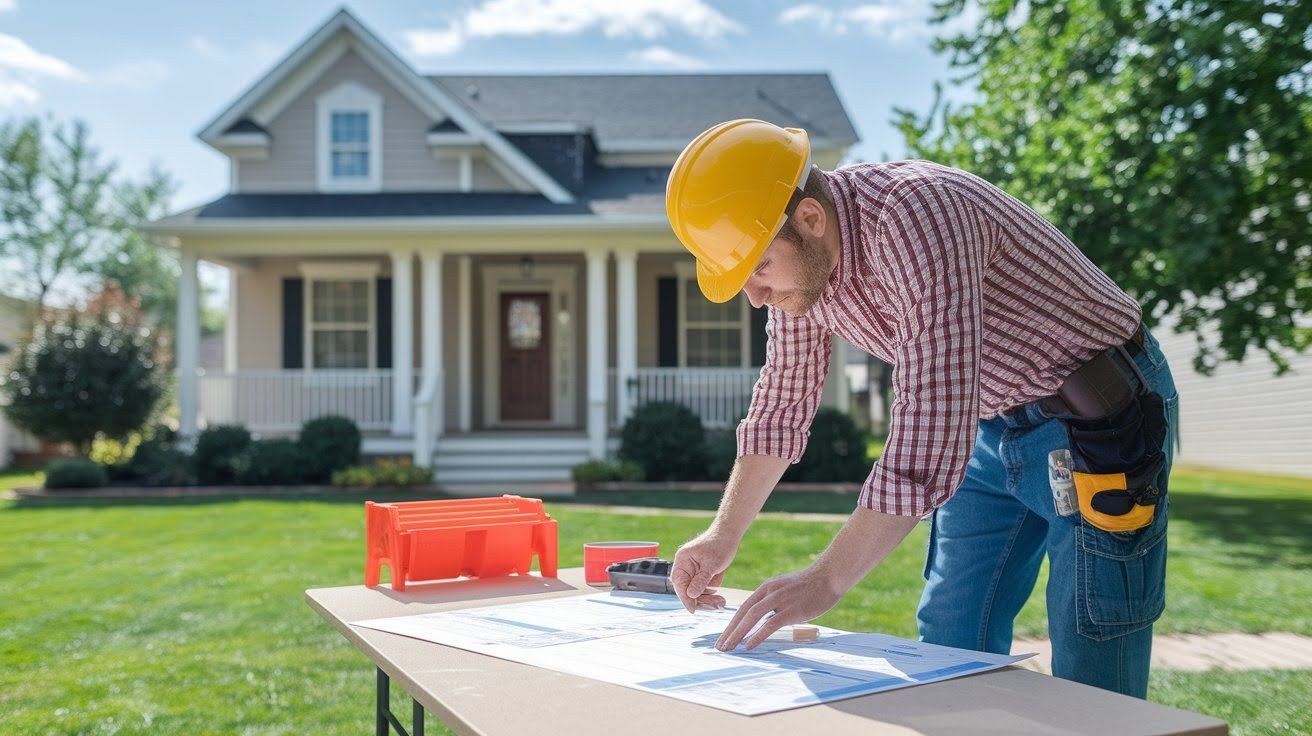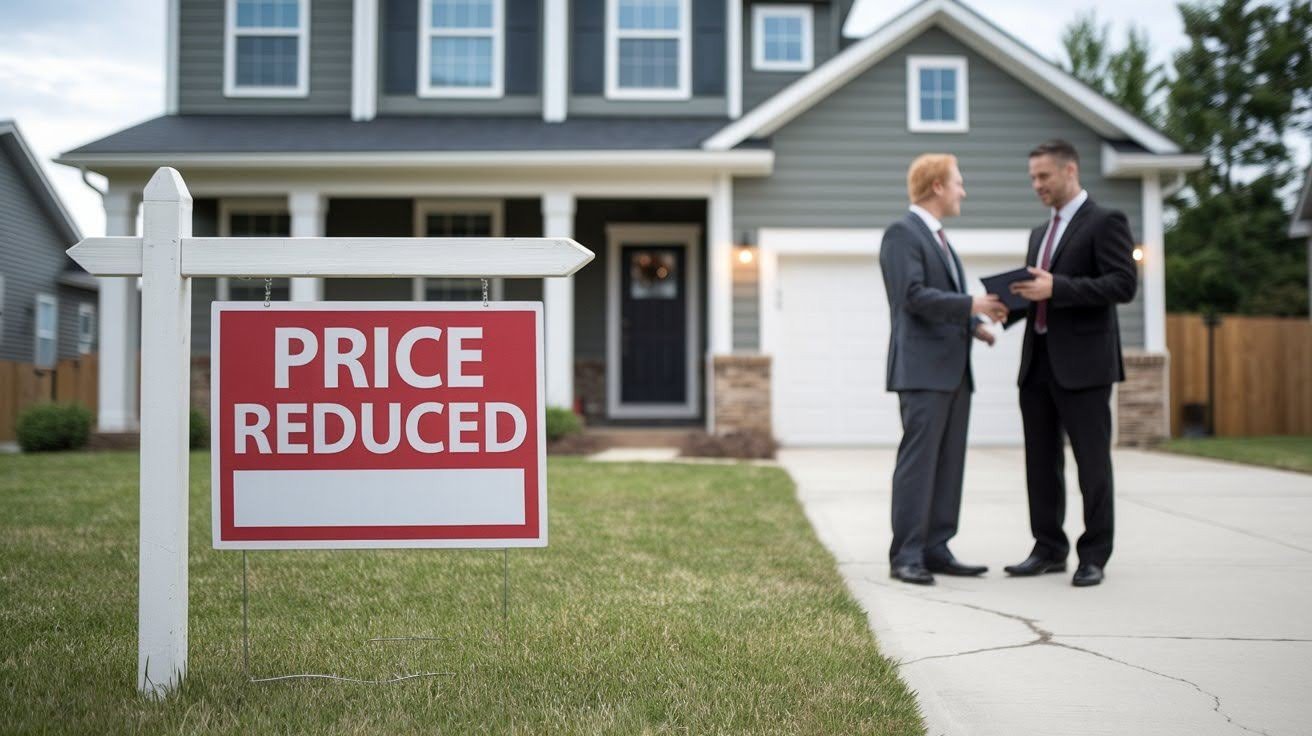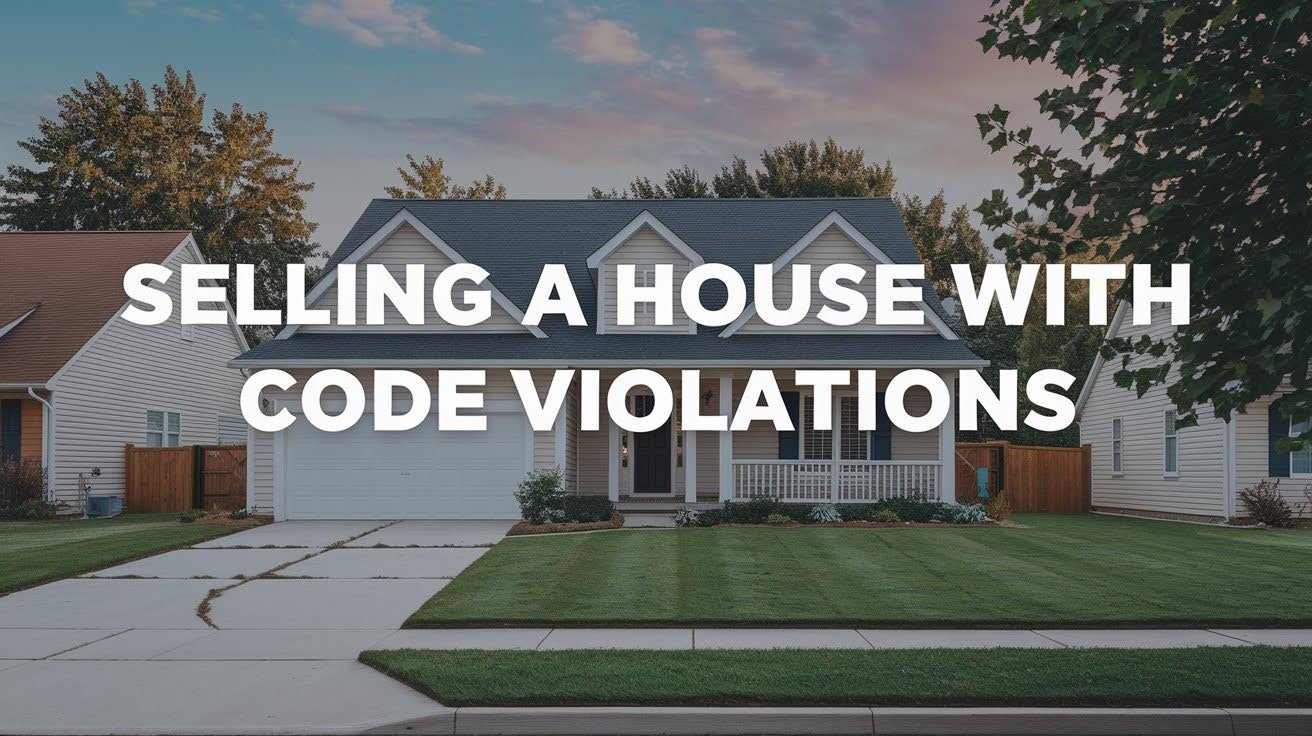Selling your home can be stressful for you. Your home might violate code if you have a little unpermitted deck. A flickering light or an electrical outlet may cause you to wonder what to do. Don’t panic, this article will clarify your options.
Thousands of homeowners have sold homes with electrical, structural, or addition violations. In this article, we will clarify the steps you can take when you encounter a code violation while selling your home.
Find out if you have to fix these violations before you list or if you can sell this property as-is to cash buyers. This article will also give you advice on negotiating who does the repairs to stay on budget and on schedule.
Your 3 Options for Selling a House With Code Violations
You’re not stuck with just one way to handle this problem you have three solid paths forward.
Option 1: Fix the Violations Before Selling

This option makes the most sense when you’re in a seller’s market, the violations are minor, and you have the money to make repairs. Fixing problems before you sell can help you get top dollar for your home.
The process is straightforward. You’ll need to get permits from your local building department, hire licensed contractors to do the work, and keep all your paperwork organized. Once repairs are done, you’ll need inspections to verify everything meets current code requirements.
When you fix violations before listing, you open your home to more buyers. Most people who get traditional loans need properties that meet code standards. By handling repairs upfront, you avoid buyer demands for credits and can often sell faster at a higher price.
Option 2: Offer Buyer Credits or Reduce the Price

This option works best if you can’t afford repairs or don’t want to deal with contractors. You can offer buyers money at closing to fix problems themselves, or you can lower your asking price to account for the violations.
Repair credits let buyers handle fixes after they own the home. You agree to give them a certain amount of money at closing that they’ll use for repairs. Price reductions work similarly you just lower the sale price by an amount that reflects the cost of fixing the violations.
Keep in mind that some loan types limit how much credit you can offer. FHA loans, for example, have strict rules about property conditions and may not allow large credit amounts. Your real estate agent can help you understand what’s allowed based on the buyer’s financing.
Option 3: Sell Your House As-Is to a Cash Buyer

This is the fastest option with the least stress. You sell the home exactly as it is, violations and all, to someone who pays cash and doesn’t need a bank loan.
The trade-off is simple: you get convenience and speed, but you’ll receive less money than if you fixed everything. Cash buyers know they’re taking on problems, so they adjust their offers to account for repair costs and their profit margins.
Real estate investors, house flippers, and iBuyer companies regularly buy homes with code violations. They have experience dealing with these issues and often close in just a few weeks. If time matters more than getting every possible dollar, this might be your best bet.
Which Option Is Right for Your Situation?
Your best choice depends on several factors unique to your home and circumstances.
Factors to Consider
The severity of violations matters most. A missing smoke detector is very different from an unpermitted addition. Small problems might cost a few hundred dollars to fix, while major issues could run into tens of thousands.
Your budget and timeline are equally important. If you need to move quickly for a job or can’t afford repair costs, fixing violations might not be realistic. But if you have time and money, repairs could help you sell for much more.
Current market conditions play a big role, too. In a hot seller’s market, buyers might overlook violations or accept as-is sales more readily. In a buyer’s market, you might need to fix problems to compete with other listings.
Quick Decision Guide
Minor violations in a strong market usually mean you should consider fixing them. The cost is low, and the payoff in sale price can be significant. You’ll attract more buyers and likely sell faster.
Major violations with limited funds point toward an as-is sale. When repairs would cost more than you have or more than you’d gain in sale price, selling to a cash buyer makes sense. You avoid the stress and upfront costs.
Middle-ground scenarios fit well with credits or price reductions. If violations are moderate and you have some flexibility, this approach lets traditional buyers purchase your home while accounting for needed repairs.
Step-by-Step Process for Selling With Code Violations
Follow these steps to handle your sale smoothly from start to finish.
Identify and Document All Violations
Start by calling your local code enforcement office. Ask if they have any violations on file for your property. They keep records of complaints and known issues that could surprise you later.
Next, hire a professional home inspector who understands local building codes. They’ll find problems you might miss and give you a detailed report. This inspection is money well spent because it prevents surprises during buyer inspections.
Get written estimates from licensed contractors for all needed repairs. These numbers help you make smart decisions about which option to choose. You’ll need them whether you’re fixing violations, negotiating credits, or pricing your home for an as-is sale.
Consult With an Experienced Real Estate Agent
Agent expertise really matters when selling a house with code violations. Not all agents handle these situations regularly, so you want someone who has helped other sellers through similar challenges.
Ask potential agents how many homes they’ve sold with code violations. Find out what strategies they recommend and why. Good agents will explain your options clearly and base their advice on current market data, not just opinions.
Top agents bring valuable connections to contractors, code specialists, and buyers who purchase fixer-uppers. They know how to price your home correctly, market it to the right audience, and handle negotiations when violations come up.
Make Your Strategy Decision
Look at your situation honestly. Compare repair costs with what you’d gain in sale price. If fixing a violation costs $5,000 but only increases your sale price by $3,000, that math doesn’t work in your favor.
Run the numbers for each option. Calculate what you’d net from fixing everything versus selling as-is. Factor in your time, stress level, and how quickly you need to sell. Sometimes the best choice isn’t just about maximum profit.
Consider your comfort level with risk, too. Fixing violations means upfront costs with no guarantee of higher offers. Selling as-is means accepting lower offers but having certainty. Credits fall somewhere in between.
Price Your Property Appropriately
Code violations directly impact home value. Buyers and appraisers factor them into what they’re willing to pay. Understanding this helps you set realistic expectations.
Look at comparable sales data in your area. Your agent can pull recent sales of similar homes, including some that sold with violations. This shows you what the market actually pays, not what you hope to get.
Your pricing strategy depends on which option you choose. If you fixed violations, price at market value. For as-is sales, subtract repair costs plus a discount for buyer inconvenience. For credit situations, the price is between these two points.
Market to the Right Buyers
Target investors and people looking for fixer-upper properties. These buyers expect to make repairs and often pay cash, which speeds up your sale. Your marketing message should appeal to their goals.
Frame your property’s potential rather than focusing on current problems. Highlight good bones, location benefits, and opportunity for value growth. Investors think about future value after repairs, not just current condition.
Be completely honest in your listings. Mention that the property has code violations and specify what option you’re offering. Transparency builds trust and attracts serious buyers who know what they’re getting into.
What Are Code Violations? [Background Context]
Code violations happen when parts of your home don’t meet current building code requirements.
How Building Codes Work
The International Residential Code (IRC) provides baseline standards that most U.S. communities follow. This code covers everything from electrical systems to structural requirements, ensuring homes are safe for people to live in.
Local municipalities modify the IRC to fit their specific needs and concerns. A city in earthquake country might have stricter foundation rules, while coastal areas focus more on wind resistance. Your local building department enforces whichever version of the code applies in your area.
Codes change over time as building technology improves and safety standards increase. A home built in 1970 met all codes back then, but might not meet today’s standards. The good news
Why Code Violations Happen
DIY renovations without permits cause many violations. Homeowners add a bathroom, finish a basement, or update electrical work without getting required approvals. These unpermitted changes might not meet code requirements, even if they look fine.
Aging infrastructure leads to violations as systems wear out and codes change. Your 40-year-old electrical panel might have been fine when installed, but it doesn’t meet current safety standards. The house didn’t change, but the rules did.
Regional differences in enforcement mean some areas check code compliance more strictly than others. Some cities require inspections before any home sale, while others only get involved if someone files a complaint.
Common Code Violations Found in Homes for Sale
These are the problems inspectors find most often during the selling process.
Easy-to-Fix Violations
Misplaced smoke alarms are extremely common. Modern codes require them in every bedroom, outside sleeping areas, and on each floor. Adding missing alarms costs just $20-50 per unit, making this one of the cheapest fixes.
Missing GFCI outlets in kitchens and bathrooms create safety risks. These special outlets prevent electrical shocks in wet areas. Replacing standard outlets with GFCI versions typically costs $100-300 for a whole house.
Handrail issues include missing railings on stairs, improper height, or inadequate support. A carpenter can usually fix these problems in a few hours for $200-600. These repairs are straightforward and won’t delay your sale much if you choose to fix them.
Moderate Violations
Electrical panel upgrades become necessary when old panels can’t handle modern electrical loads or use outdated technology like fuses. Replacing a panel costs $1,500-3,000, typically. This is important for safety and might be required by buyers’ lenders.
Bathroom venting problems occur when bathrooms lack proper exhaust fans or when fans don’t vent outside. Moisture buildup leads to mold and structural damage. Installing correct venting runs $300-800 per bathroom, depending on complexity.
Foundation cracks need professional evaluation. Small cracks might just need sealing for $500-1,000, but larger structural issues could cost $5,000-15,000 or more to repair. A structural engineer’s report helps you understand what’s really needed.
Major Violations
Unpermitted additions or conversions top the list of expensive problems. A converted garage or added bedroom without permits might need extensive work to bring it up to code, or you might need to reverse the changes entirely. Costs vary wildly from $10,000 to $50,000 or more.
Structural defects like sagging roofs, compromised foundations, or inadequate support beams require immediate attention. These repairs often involve engineers, special contractors, and multiple inspections. Budget $15,000-50,000 depending on severity.
Outdated plumbing systems using materials like polybutylene pipes need replacement. These pipes were common in the 1980s but often fail and cause water damage. Repiping a house costs $4,000-15,000, depending on size.
What Happens to Code Violations After the Sale?
Understanding who’s responsible after closing protects both you and the buyer.
Responsibility Transfer to New Owners
Violations typically carry over to buyers when you sell as-is. The new owner becomes responsible for fixing them, just like they become responsible for the mortgage and property taxes. This is why disclosure is so important.
What gets resolved at closing depends on your sales contract. If you agreed to fix specific violations, you must complete those repairs before closing. If the buyer accepts the property as-is, nothing gets resolved, and they take on all issues.
Buyer expectations vary based on their financing. Cash buyers often accept properties with violations. But buyers using FHA or VA loans might not be able to close until certain safety issues are fixed.
Protecting Yourself as a Seller
Proper contract language makes everything clear. Your sales contract should explicitly state which violations exist, what you’re fixing (if anything), and what the buyer is accepting. This prevents confusion and protects you from future claims.
Documentation requirements include keeping all inspection reports, violation notices, repair estimates, and correspondence with the code enforcement office. If a buyer claims you hid something, your paperwork proves what you disclosed and when.
Avoiding post-sale disputes starts with total honesty. Disclose every violation you know about in writing. Never tell a buyer something is “probably fine” if you haven’t had it checked. Good documentation and clear communication during the sale prevent buyers from coming back with complaints later.
Expert Tips for a Successful Sale Despite Code Violations
Here are proven strategies that help sellers like you close deals even with code problems:
- Time your sale right: Spring and summer typically bring more buyers, including investors who buy homes with issues. Market conditions that favor sellers give you more options and stronger negotiating power when dealing with violations.
- Choose an agent who specializes in distressed properties: Not all agents handle code violation sales well. Look for someone with specific experience in these situations who can guide you through the unique challenges.
- Hire a real estate attorney for complex situations: If you have serious violations, multiple properties, or confusing legal issues, an attorney protects your interests. They ensure your contracts are solid and help avoid future liability.
- Use licensed contractors for any repairs you make: Never cut corners with unlicensed workers. Proper permits and licensed contractors ensure repairs meet code and protect you from liability. Keep all receipts and completion certificates.
- Don’t over-improve your home before selling: Fix the violations, but don’t upgrade beyond what’s required. Adding granite countertops won’t help when buyers are worried about electrical issues. Focus your money on code compliance, not fancy finishes.
- Never hide or minimize violations: Honesty is your best protection. If you know about a problem, disclose it in writing. Buyers who feel tricked will sue, and judges rarely side with sellers who hid known defects.
- Price realistically based on current condition: Overpricing a home with violations means it sits on the market getting stale. Buyers who want fixer-uppers are savvy about costs. Price aggressively for your chosen strategy, and you’ll sell faster.
Conclusion
You can correct code violations before selling, offer to pay to fix them, sell the house as is and take a price cut, or accept a cash buy. The best solution is determined by your budget, the time frame, and the severity of code violations, which affects the price.
It is a good idea to use a real estate agent, licensed contractors, a lawyer, and provide disclosures, to put an actual price on your house to protect yourself when you are selling a house yourself, and to attract buyers.
Your best course of action is to know your options and the housing market to get the best deal for your situation when deciding if you should fix it or sell at closing with code violations.
Frequently Asked Questions
Can I Sell a House With Code Violations?
Yes, you can definitely sell a house with code violations. You have three main options: fix the violations before listing, offer repair credits or reduce your price, or sell as-is to a cash buyer. The best choice depends on your budget, timeline, and the severity of the violations.
Do I Have to Fix Code Violations Before Selling My House?
No, you don’t have to fix code violations before selling. However, some buyers’ lenders might require certain safety issues to be fixed before closing. Cash buyers and investors often purchase homes with violations as-is.
How Much Do Code Violations Reduce Home Value?
Code violations typically reduce home value by the repair cost plus 10-30% extra for buyer inconvenience. Minor violations might lower value by a few thousand dollars, while major structural or safety issues can reduce value by $20,000-50,000 or more.
What Happens If I Don’t Disclose Code Violations?
Failing to disclose known code violations can lead to serious legal problems. Buyers can sue you for fraud, rescind the sale, or demand you pay for repairs after closing. Most states require sellers to disclose material defects.
Will Buyers Walk Away From Homes With Code Violations?
Some buyers will walk away, but many won’t, especially investors and experienced buyers looking for fixer-uppers. Your buyer pool might be smaller, but selling a house with code violations happens successfully every day.





